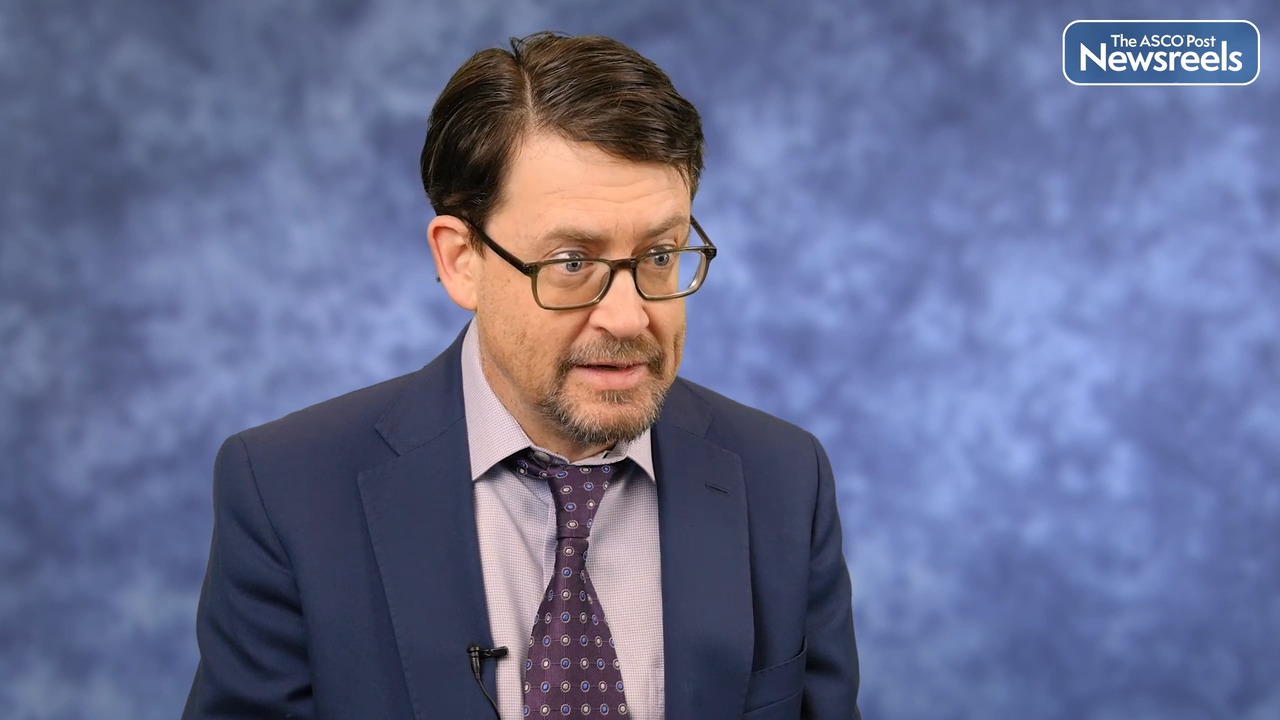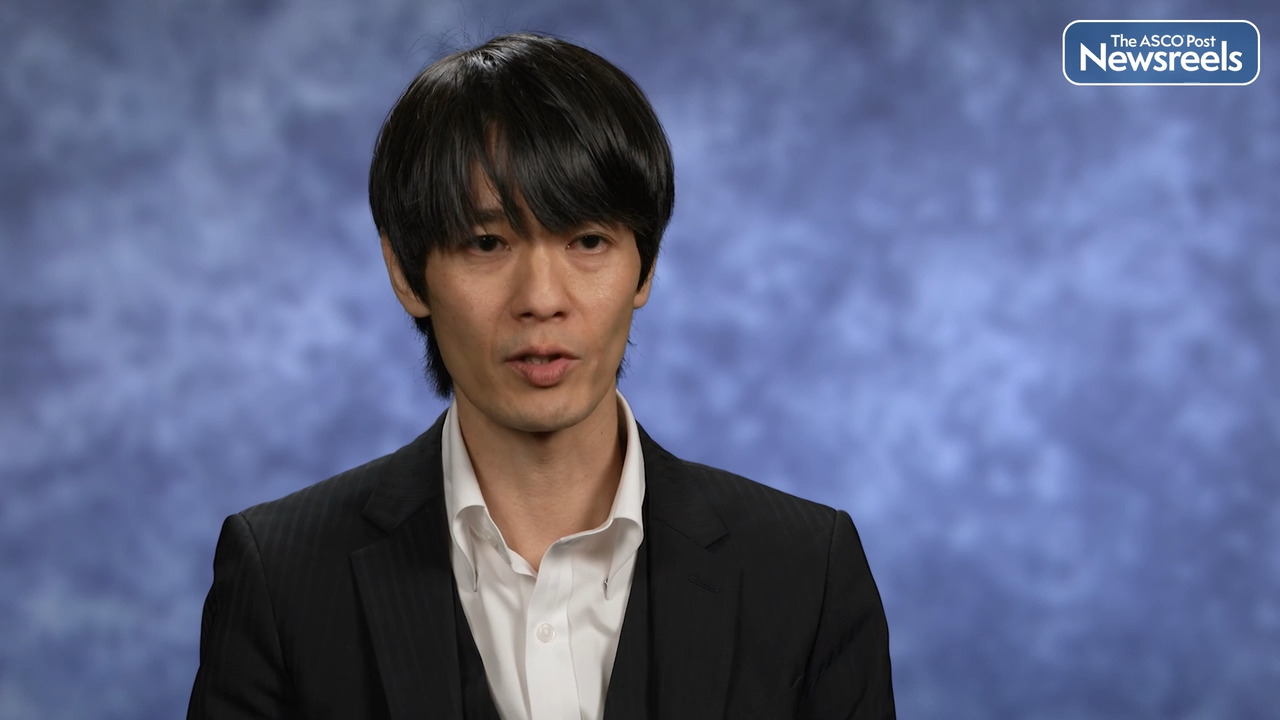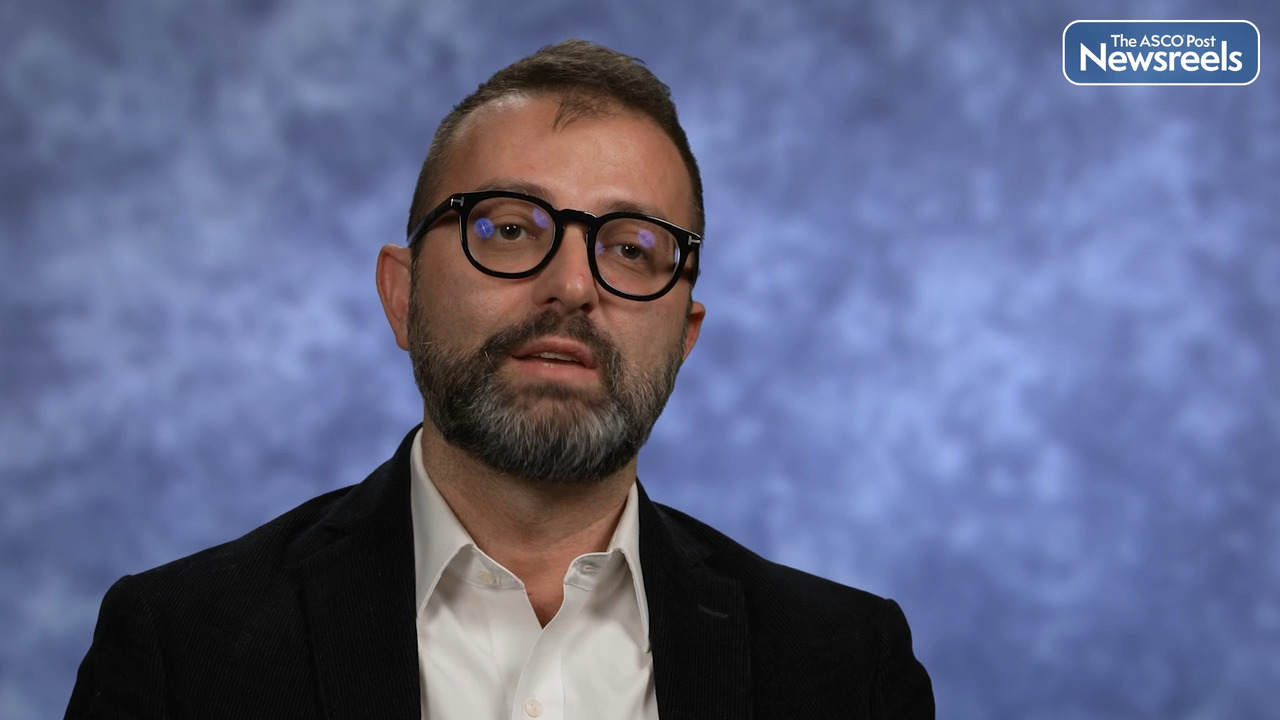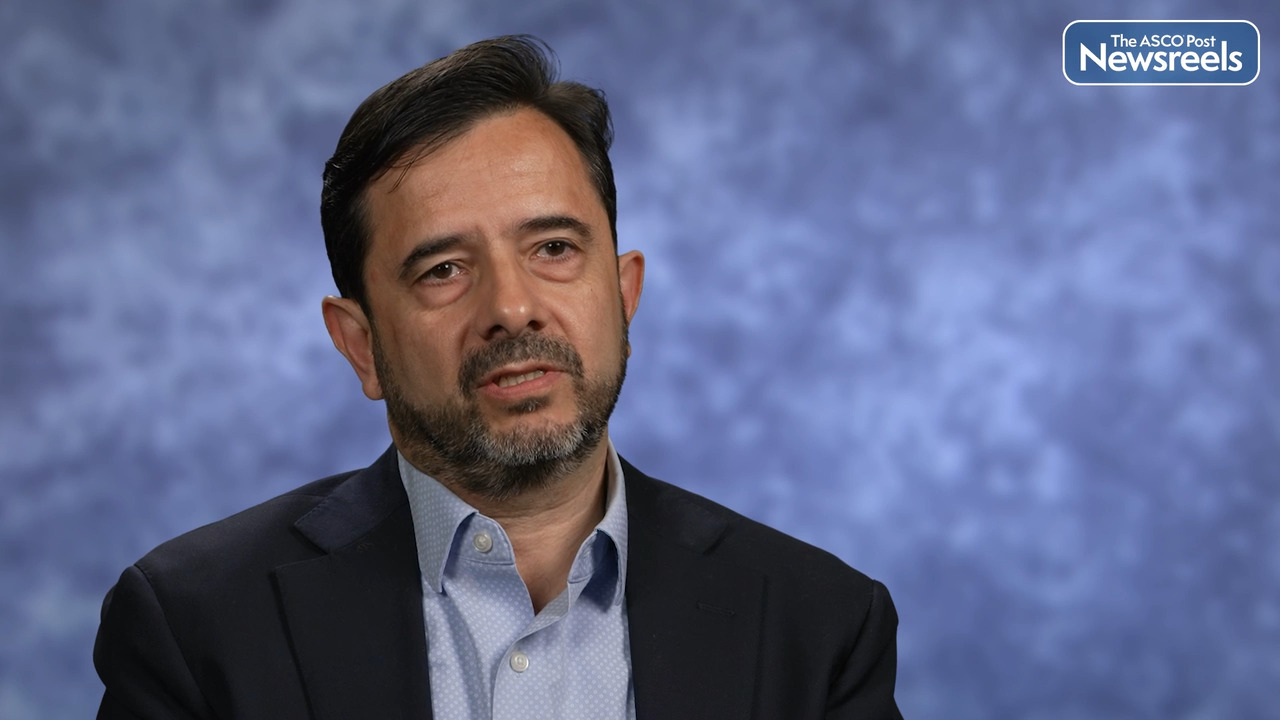Investigational Dual PD-1 and TIGIT Blockade in Advanced Gastroesophageal Cancer
Early findings from the phase II EDGE-Gastric trial indicate the potential for two novel agents to make a difference in advanced gastroesophageal adenocarcinoma, according to findings reported at the ASCO Plenary Series: November 2023 Session by Yelena Y. Janjigian, MD, Chief of the...
FDA Amends Pembrolizumab’s Gastric Cancer Indication
On November 7, the U.S. Food and Drug Administration (FDA) revised the existing indication of pembrolizumab (Keytruda) in combination with trastuzumab, fluoropyrimidine, and platinum-containing chemotherapy for the first-line treatment of patients with locally advanced unresectable or metastatic...
Novel Antibody-Drug Conjugate Shows Potential in Treating CLDN18.2-Positive Gastric and GEJ Cancers
A first-in-class, claudin 18.2 (CLDN18.2)-targeted antibody-drug conjugate may be a new treatment option for patients with advanced gastric/gastroesophageal junction (GEJ) cancers, according to data presented by Xu et al during the ASCO Plenary Series: November 2023 Session (Abstract 434420)....
Adding Pembrolizumab to Trastuzumab and Chemotherapy in HER2-Positive Gastric/Gastroesophageal Junction Adenocarcinoma: KEYNOTE-811
In interim analyses from the phase III KEYNOTE-811 trial reported in The Lancet, Yelena Y. Janjigian, MD, and colleagues found that the addition of pembrolizumab to trastuzumab and chemotherapy in first-line treatment of patients with locally advanced or metastatic HER2-positive...
Addition of First-Line Pembrolizumab to Chemotherapy in HER2-Negative Advanced Gastric Cancer
As reported in The Lancet Oncology by Sun Young Rha, MD, and colleagues, the phase III KEYNOTE-859 trial has shown that the addition of first-line pembrolizumab to chemotherapy was associated with a statistically significant improvement in overall survival in patients with HER2-negative advanced...
Perioperative Chemotherapy and Pembrolizumab in Locally Advanced Resectable Gastric and Gastroesophageal Junction Adenocarcinomas
In a phase II trial reported in JAMA Oncology, Manji et al found that perioperative chemotherapy and pembrolizumab showed activity in locally advanced resectable gastric and gastroesophageal junction adenocarcinoma. Study Details Thirty-four evaluable patients were enrolled in the...
Cadonilimab, an Anti–PD-1/CTLA-4 Bispecific Antibody, for Advanced Solid Tumors
In a Chinese phase 1b/II trial (COMPASSION-03) reported in The Lancet Oncology, Gao et al found that the anti–PD-1/CTLA-4 bispecific antibody cadonilimab showed activity in previously treated patients with a range of advanced solid tumors, including advanced cervical cancer, esophageal squamous...
Quality of Life With Nivolumab Plus Chemotherapy in Advanced Gastric/GEJ Cancer or Esophageal Adenocarcinoma
As reported in the Journal of Clinical Oncology, Markus Moehler, MD, and colleagues found that in the phase III CheckMate 649 trial, the addition of nivolumab to chemotherapy was associated with generally better patient-reported health-related quality of life outcomes in patients with advanced...
Addition of First-Line Regorafenib to Nivolumab and Chemotherapy in Metastatic Esophageal Cancer
In a single-institution phase II study reported in The Lancet Oncology, Cytryn et al found that the combination of regorafenib, nivolumab, and FOLFOX (fluorouracil, leucovorin, and oxaliplatin) showed activity as a first-line treatment regimen for patients with HER2-negative metastatic...
Novel Targeted Therapy Combination May Be an Effective First-Line Option for Gastric or Gastroesophageal Junction Adenocarcinoma
Researchers have found that the novel targeted therapy zolbetuximab in combination with a standard chemotherapy may extend survival in patients with advanced gastric or gastroesophageal junction adenocarcinoma and overexpression of the claudin-18 isoform 2 protein (CLDN18.2), according to a novel...
Association of Pathologic Lymph Node Regression After Neoadjuvant Chemotherapy With Outcomes in Esophageal Adenocarcinoma
In a UK study reported in the Journal of Clinical Oncology, Moore et al found that increased pathologic lymph node regression after neoadjuvant chemotherapy was associated with better outcomes in esophageal adenocarcinoma. Study Details The study involved patients treated with neoadjuvant...
Improving Screening and Surveillance Practices for Early Cancer Detection in Patients With Barrett’s Esophagus
A recent study published in Gastroenterology by Wani et al found that at least a quarter of all esophageal adenocarcinomas may be detected within a year of a negative upper endoscopy in patients with newly diagnosed Barrett's esophagus. The investigators proposed methods for improving the efficacy...
Individual Patient Meta-analysis of Neoadjuvant Chemotherapy and Chemoradiotherapy for Esophageal or GEJ Carcinoma
In a meta-analysis reported in the Journal of Clinical Oncology, Faron et al found that neoadjuvant chemotherapy and chemoradiotherapy were associated with better survival vs upfront surgery in patients with thoracic esophageal or gastroesophageal junction (GEJ) carcinoma. Study Details The study...
Second-Line Trastuzumab, Ramucirumab, and Paclitaxel in Previously Treated Patients With HER2-Positive Advanced Gastric or Gastroesophageal Junction Cancer
In a Korean phase Ib/II trial reported in the Journal of Clinical Oncology, Kim et al found that trastuzumab combined with ramucirumab and paclitaxel showed activity in the second-line treatment of patients with HER2-positive advanced gastric or gastroesophageal junction cancer whose disease...
Addition of Tislelizumab to Chemotherapy Improves Survival in Treatment of Metastatic Esophageal Squamous Cell Carcinoma
As reported in The Lancet Oncology by Jianming Xu, MD, of Fifth Medical Center, Chinese PLA General Hospital, Beijing, corresponding author Harry H. Yoon, MD, of the Department of Oncology, Mayo Clinic, Rochester, and colleagues, an interim analysis of the phase III RATIONALE-306 trial has shown...
Robotic-Assisted Resection of Challenging Gastric GISTs May Be Safe and Effective
Robot-assisted resection may be safe and effective at removing difficult-to-reach gastric gastrointestinal stromal tumors (GISTs), according to a novel study published by Lwin et al in the Journal of Surgical Research. Background For gastric GISTs, surgery is the standard treatment option; however, ...
T-DXd in HER2-Positive Advanced Gastric or Gastroesophageal Junction Cancer: DESTINY-Gastric02
In the phase II DESTINY-Gastric02 trial reported in The Lancet Oncology, Eric Van Cutsem, MD, PhD, and colleagues found that fam-trastuzumab deruxtecan-nxki (T-DXd) was active in patients with HER2-positive advanced gastric or gastroesophageal junction cancer with disease progression on or after a...
S-1 Chemoradiotherapy for Older Patients With Inoperable Esophageal Squamous Cell Carcinoma
In a Chinese phase III trial reported in JAMA Network Open, Wang et al found that oral S-1 chemotherapy given with simultaneous integrated boost radiotherapy (SIB-RT) and following SIB-RT improved overall survival in patients aged 70 or older with inoperable esophageal squamous cell carcinoma....
Risk of Early-Onset Digestive Tract Cancers Among Young Adults With Nonalcoholic Fatty Liver Disease
In a Korean nationwide cohort study reported in the Journal of Clinical Oncology, Park et al found that individuals aged 20 to 39 years with nonalcoholic fatty liver disease (NAFLD) were at an increased risk of developing early-onset digestive tract cancers. Study Details The study included data on ...
Addition of Tislelizumab to Chemotherapy in First-Line Treatment of Advanced or Metastatic Esophageal Squamous Cell Carcinoma
As reported in The Lancet Oncology by Xu et al, an interim analysis of the phase III RATIONALE-306 trial has shown improved overall survival with the addition of the anti–PD-1 antibody tislelizumab to chemotherapy in the first-line treatment of advanced or metastatic esophageal squamous cell...
First-Line Zolbetuximab Plus mFOLFOX6 in CLDN18.2-Positive, HER2-Negative Advanced Gastric or Gastroesophageal Junction Adenocarcinoma
As reported in The Lancet by Kohei Shitara, MD, and colleagues, the phase III SPOTLIGHT trial has shown significantly prolonged progression-free and overall survival with the addition of the anti–claudin-18 isoform 2 (CLDN18.2) antibody zolbetuximab to mFOLFOX6 (modified leucovorin [or...
Addition of Toripalimab to Definitive Chemoradiotherapy in Locally Advanced Esophageal Squamous Cell Carcinoma
In a Chinese single-center phase II trial (EC-CRT-001) reported in The Lancet Oncology, Zhu et al found that the addition of the PD-1 inhibitor toripalimab to definitive chemoradiotherapy resulted in “encouraging activity and acceptable toxicity” in patients with locally advanced esophageal...
Michael K. Gibson, MD, PhD, on Metastatic Esophageal Squamous Cell Carcinoma: New First-Line Systemic Treatment Options
Michael K. Gibson, MD, PhD, of Vanderbilt-Ingram Cancer Center, discusses the importance of developing additional treatment strategies for patients with advanced or metastatic esophageal squamous cell carcinoma and describes the role of immune checkpoint inhibitors. Dr. Gibson also reviews the available evidence on the use of nivolumab in this patient population.
Lower-Income Patients With Early-Stage Esophageal Adenocarcinoma May Face Disparities in Cancer Care and Higher Mortality Rates
Patients with early-stage esophageal adenocarcinoma from lower-income households may be significantly less likely to receive a potentially life-saving treatment and may be more likely to die from the disease, according to a new study published by Geng et al in Clinical Gastroenterology and...
First ASCO Guideline for Immunotherapy and Targeted Therapy in Advanced Gastroesophageal Cancer Now Available
An ASCO expert panel has developed a comprehensive guideline for immunotherapy and targeted therapy in patients with advanced gastroesophageal cancer.1 The guideline is based on the many recent advances in immunotherapy and targeted therapy. “The role of immunotherapy has changed practice in the...
Phase III Trials Confirm Benefit of First-Line Anti–PD-1 Inhibition Plus Chemotherapy in Gastric Cancer
Two phase III trials evaluating the addition of drugs targeting PD-1 to chemotherapy—RATIONALE 305 and CheckMate 649—confirmed the benefit of this approach as first-line therapy for advanced gastric, gastroesophageal junction, or esophageal adenocarcinoma, in findings presented at the 2023 ASCO GI...
Expert Point of View: Pretesh R. Patel, MD
Session co-moderator, Pretesh R. Patel, MD, Associate Professor of Radiation Oncology at Winship Cancer Institute of Emory University, shared his thoughts on the Neo-AEGIS1 findings with The ASCO Post. “I think we continue to have equipoise about chemoradiation and perioperative chemotherapy in...
Neo-AEGIS Trial Finds Two Approaches Comparable in Treating Advanced Esophageal Cancer
A randomized trial that sought to determine the optimal approach to treating locally advanced esophageal or gastroesophageal junction cancer has ended in “equipoise,” according to the investigators of the Neo-AEGIS trial. In a study reported at the 2023 ASCO GI Cancers Symposium, perioperative...
KEYNOTE-859 Interim Analysis: Overall Survival Benefit for First-Line Pembrolizumab in Advanced Gastric Cancer
Results of the interim analysis of KEYNOTE-859 are in, and they confirm the overall survival benefit of first-line immunotherapy plus chemotherapy in advanced gastric cancer. Pembrolizumab plus a fluoropyrimidine- and platinum-containing doublet provided a statistically significant improvement in...
Kohei Shitara, MD, on Gastric or Gastroesophageal Junction Adenocarcinoma: Recent Data on Zolbetuximab Plus mFOLFOX6
Kohei Shitara, MD, of Japan’s National Cancer Center Hospital East, discusses the SPOTLIGHT study’s phase III findings on zolbetuximab plus mFOLFOX6 as first-line treatment for patients with the biomarker claudin-18.2–positive and HER2-negative locally advanced unresectable or metastatic gastric or gastroesophageal junction adenocarcinoma. The regimen seems to have led to an improvement in both progression-free and overall survival, with survival benefits also observed across most subgroups. Zolbetuximab plus mFOLFOX6 is potentially a new standard-of-care treatment for this population (Abstract LBA292).
Filippo Pietrantonio, MD, on Gastric or Gastroesophageal Junction Adenocarcinoma: Recent Data on Treatment With Tremelimumab and Durvalumab
Filippo Pietrantonio, MD, of Italy’s Istituto Nazionale dei Tumori, discusses phase II results from the INFINITY trial of tremelimumab and durvalumab as neoadjuvant treatment of patients with microsatellite instability–high (MSI) resectable gastric or gastroesophageal junction adenocarcinoma (GAC/GEJAC). These results open the way to investigate nonoperative management in patients with clinical, pathologic, and molecular complete response after T300/D (300 mg of tremelimumab and 1,500 mg every 4 weeks of durvalumab) (Abstract 358).
Nick Pavlakis, PhD, MBBS, on Gastroesophageal Cancer: New Findings on the Use of Regorafenib
Nick Pavlakis, PhD, MBBS, of Australia’s Royal North Shore Hospital, discusses phase III findings from the INTEGRATE IIa study of regorafenib vs placebo in refractory advanced gastroesophageal cancer. The trial provides a platform for the investigation of combination therapy with an immune checkpoint inhibitor, now underway in the INTEGRATE IIb study, which is evaluating regorafenib plus nivolumab compared with standard chemotherapy in patients with this type of cancer who have received two lines of prior therapy (Abstract LBA294).
Subset of Patients With Advanced Gastric/GEJ Cancer May Benefit From CLDN18.2-Targeted Drug Zolbetuximab: SPOTLIGHT Study
Initial data from the global phase III SPOTLIGHT trial could herald the use of a new targeted agent for a subset of patients with advanced gastric or gastroesophageal junction (GEJ) adenocarcinoma. First-line treatment with zolbetuximab, which targets the transmembrane protein claudin 18.2...
First-Line Zanidatamab Plus Chemotherapy for HER2-Expressing Metastatic Gastroesophageal Adenocarcinoma
Tolerability and efficacy results—including the first overall survival data—from a phase II trial examining first-line zanidatamab, an investigational HER2-targeted bispecific antibody, in combination with chemotherapy for patients with HER2-expressing metastatic gastroesophageal adenocarcinoma...
T-DXd in Pretreated Patients With HER2-Low Advanced Gastric or Gastroesophageal Junction Adenocarcinoma
As reported in the Journal of Clinical Oncology by Yamaguchi et al, an exploratory cohort analysis in a Japanese/South Korean phase II trial (DESTINY-Gastric01) indicated that fam-trastuzumab deruxtecan-nxki (TDX-d) showed activity in previously treated—but anti-HER2 treatment–naive—patients with...
Addition of Bemarituzumab to mFOLFOX in FGFR2b-Selected Gastric or Gastroesophageal Junction Adenocarcinoma
In the phase II FIGHT trial reported in The Lancet Oncology, Zev A. Wainberg, MD, and colleagues found numerically better progression-free survival with the addition of the anti-FGFR2b antibody bemarituzumab to mFOLFOX (modified fluorouracil, leucovorin, and oxaliplatin) in patients with...
Genetic Variation May Explain Racial Disparity in Esophageal Cancer Cases
Esophageal adenocarcinoma is a type of cancer affecting the mucus-secreting glands of the lower esophagus and is the most common form of esophageal cancer. It is often preceded by Barrett’s metaplasia, a deleterious change in cells lining the esophagus. Though the cause of esophageal adenocarcinoma ...
Is PD-L1 Expression a Good Predictor of Survival Benefit in Patients With Advanced Gastroesophageal Cancer Treated With Immunotherapy?
In a systematic review and meta-analysis of phase III trials of immune checkpoint inhibitor treatment in patients with advanced gastroesophageal cancer reported in JAMA Oncology, Harry H. Yoon, MD, MS, and colleagues found that PD-L1 expression was the strongest predictor of overall survival...
Neoadjuvant Nivolumab Plus Ipilimumab in Localized dMMR/MSI-H Gastric Cancer
As reported in the Journal of Clinical Oncology by Thierry André, MD, and colleagues, the French (GERCOR) phase II NEONIPIGA trial has shown a high pathologic complete response rate with nivolumab/ipilimumab neoadjuvant therapy in patients with localized deficient mismatch repair...
RATIONALE-306: Survival Benefit Attained With Tislelizumab in Advanced Esophageal Cancer
In patients with advanced or metastatic esophageal squamous cell carcinoma, the addition of the checkpoint inhibitor tislelizumab to first-line chemotherapy significantly improved overall survival vs chemotherapy alone, according to an interim analysis of the global phase III RATIONALE-306 trial....
Early Research Finds Link May Connect Cell-Signaling Pathway to Development of Esophageal Cancers, Barrett’s Esophagus
A team of researchers believe they have identified a cell-signaling pathway responsible for the development of esophageal adenocarcinomas, an aggressive type of esophageal cancer that has gradually become more common, even in younger people. Research published by Venkitachalam et al in...
Trastuzumab and Nivolumab Plus Either Ipilimumab or FOLFOX as First-Line Treatment for HER2-Positive Advanced Esophagogastric Adenocarcinoma
As reported in JAMA Oncology by Stein et al, the German phase II INTEGA trial showed improved survival with the addition of modified FOLFOX6 (fluorouracil, leucovorin, oxaliplatin) vs the addition of ipilimumab to trastuzumab/nivolumab in the first-line treatment of patients with advanced or...
Addition of Trastuzumab/Pertuzumab to Perioperative FLOT Chemotherapy in HER2-Positive Esophagogastric Adenocarcinoma
In the German phase II PETRARCA trial of the AIO EGA Study Group, reported in the Journal of Clinical Oncology, Hofheinz et al found that the addition of trastuzumab and pertuzumab to perioperative FLOT (fluorouracil, leucovorin, oxaliplatin, and docetaxel) improved both the pathologic complete...
Nivolumab in Combination With Chemotherapy and in Combination With Ipilimumab in Advanced Esophageal Squamous Cell Carcinoma
On May 27, 2022, nivolumab was approved for use in combination with fluoropyrimidine- and platinum-based chemotherapy and in combination with ipilimumab for the first-line treatment of advanced or metastatic esophageal squamous cell carcinoma.1 Supporting Efficacy Data Approval was based on...
FDA Approves Two Nivolumab-Based Regimens as First-Line Treatments for Unresectable Advanced or Metastatic Esophageal Squamous Cell Carcinoma
On May 27, 2022, the U.S. Food and Drug Administration (FDA) approved the following for the first-line treatment of patients with advanced or metastatic esophageal squamous cell carcinoma: Nivolumab (Opdivo) in combination with fluoropyrimidine- and platinum-based chemotherapy Nivolumab in...
Rise of Esophageal Cancer and Barrett’s Esophagus Rates in Middle-Aged Adults
Adults aged 45 to 64 years experienced a nearly doubled rate of esophageal cancer and a 50% increase in the precancerous condition Barrett’s esophagus between 2012 and 2019, according to a database analysis of roughly 5 million patients presented by Qumseya et al at Digestive Disease Week 2022...
PD-1 Inhibition in First-Line Treatment of Advanced Esophageal Squamous Cell Carcinoma: More to Come on New Paradigm
Esophageal cancer is associated with significant morbidity and mortality worldwide, with more than 600,000 new cases and 540,000 deaths in 2020. The squamous cell histology comprises nearly 90% of cases globally, despite its steady decline in the United States over the past 40 years. Historically,...
Overall Survival Benefit With Nivolumab Plus Chemotherapy or Ipilimumab vs Chemotherapy Alone in Esophageal Squamous Cell Carcinoma
As reported in The New England Journal of Medicine by Yuichiro Doki, MD, of Osaka University Graduate School of Medicine, Japan, and colleagues, the phase III CheckMate 648 trial has shown improved overall survival with nivolumab combined with chemotherapy or ipilimumab vs chemotherapy alone in...
Delays in Surgery for Advanced Esophageal Cancer Result in Significantly Worse Survival
Delays in surgery for esophageal cancer did not appear to have much impact on patients’ relative survival for early-stage cancer compared with patients who had surgery early, but they did reduce the relative survival rate by almost half for patients with more advanced disease, according to an...
Second-Line Tislelizumab vs Chemotherapy for Advanced Esophageal Squamous Cell Carcinoma
In the phase III RATIONALE-302 trial reported in the Journal of Clinical Oncology, Shen et al found that the anti–PD-1 antibody tislelizumab significantly improved overall survival vs chemotherapy in the second-line treatment of patients with advanced or metastatic esophageal squamous cell...




